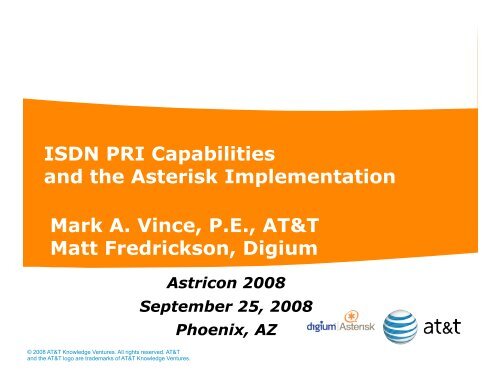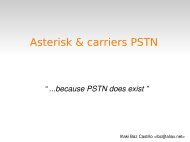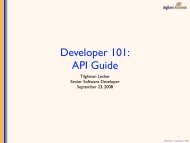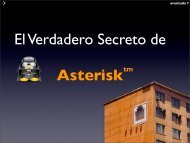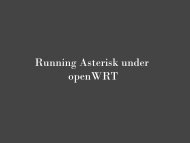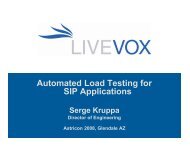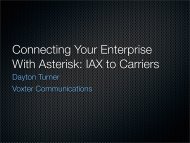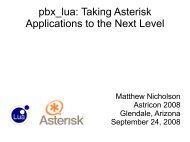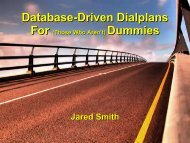ISDN PRI Capabilities and the Asterisk Implementation ... - Asterisk-ES
ISDN PRI Capabilities and the Asterisk Implementation ... - Asterisk-ES
ISDN PRI Capabilities and the Asterisk Implementation ... - Asterisk-ES
You also want an ePaper? Increase the reach of your titles
YUMPU automatically turns print PDFs into web optimized ePapers that Google loves.
<strong>ISDN</strong> <strong>PRI</strong> <strong>Capabilities</strong><br />
<strong>and</strong> <strong>the</strong> <strong>Asterisk</strong> <strong>Implementation</strong><br />
Mark A. Vince, P.E., AT&T<br />
Matt Fredrickson, Digium<br />
© 2008 AT&T Knowledge Ventures. All rights reserved. AT&T<br />
<strong>and</strong> <strong>the</strong> AT&T logo are trademarks of AT&T Knowledge Ventures.<br />
Astricon 2008<br />
September 25, 2008<br />
Phoenix, AZ
Why Are We Talking About <strong>ISDN</strong>?<br />
• PSTN has a large user community<br />
• <strong>ISDN</strong> <strong>PRI</strong> is an “incumbent” interface<br />
• Matured over 20 years<br />
• St<strong>and</strong>ardized.... well sorta... vendor specific<br />
• Way to integrate VOIP <strong>and</strong> “rest of <strong>the</strong> world”<br />
• Learn from those who have gone before<br />
© 2008 AT&T Knowledge Ventures. All rights reserved. AT&T<br />
<strong>and</strong> <strong>the</strong> AT&T logo are trademarks of AT&T Knowledge Ventures. Page 2
<strong>ISDN</strong> Application Architecture<br />
PSTN<br />
4E, 5E,<br />
DMS,<br />
Siemens,<br />
<strong>ISDN</strong><br />
<strong>PRI</strong><br />
IP<br />
VOIP<br />
Router<br />
Legacy<br />
PBX<br />
TDM<br />
IP<br />
© 2008 AT&T Knowledge Ventures. All rights reserved. AT&T<br />
<strong>and</strong> <strong>the</strong> AT&T logo are trademarks of AT&T Knowledge Ventures. Page 3
Areas of Discussion<br />
• <strong>ISDN</strong> <strong>PRI</strong> overview<br />
Layer 1 – T1<br />
Layer 2 – Q.921<br />
Layer 3 – Q.931<br />
• <strong>Asterisk</strong> <strong>PRI</strong> architecture<br />
Zaptel (Dahdi)<br />
Libpri<br />
• Connecting to <strong>Asterisk</strong> – Real examples<br />
Avaya <strong>PRI</strong><br />
Cisco <strong>PRI</strong><br />
=>> <strong>Asterisk</strong> zaptel, zapata settings<br />
© 2008 AT&T Knowledge Ventures. All rights reserved. AT&T<br />
<strong>and</strong> <strong>the</strong> AT&T logo are trademarks of AT&T Knowledge Ventures. Page 4
What is <strong>ISDN</strong> <strong>PRI</strong>?<br />
Integrated Services Digital Network<br />
Common infrastructure for voice, data <strong>and</strong> video (circa 1980s)<br />
Feature rich signaling interface<br />
Two types: BRI <strong>and</strong> <strong>PRI</strong><br />
Primary Rate Interface<br />
Provided via a T1 / E1 (1.544 Mbs / 2.048 Mbs)<br />
Bearer channels (B-channels, H-channels), signaling channel (D-channel)<br />
Two types: Facility Associated Signaling (FAS) <strong>and</strong> Non Facility Associated<br />
Signaling (NFAS)<br />
Basic Rate Interface – BRI – 2B+D not covered today<br />
H-channels not covered today<br />
© 2008 AT&T Knowledge Ventures. All rights reserved. AT&T<br />
<strong>and</strong> <strong>the</strong> AT&T logo are trademarks of AT&T Knowledge Ventures. Page 5
Primary Rate Interface – <strong>PRI</strong> – 23B+D / 30B+D<br />
Facility Associated Signaling (FAS)<br />
D-Channel<br />
B-Channel<br />
B-Channel<br />
<strong>ISDN</strong><br />
Protocol<br />
Q.931<br />
Q.921<br />
T1 / E1<br />
B-Channel<br />
B-Channel<br />
B-Channel<br />
• Looks like a “regular” T1<br />
• All signaling in <strong>the</strong> D-channel<br />
• B-channels are true “pipes”<br />
© 2008 AT&T Knowledge Ventures. All rights reserved. AT&T<br />
<strong>and</strong> <strong>the</strong> AT&T logo are trademarks of AT&T Knowledge Ventures. Page 6
Primary Rate Interface – <strong>PRI</strong> – nB+D<br />
Non Facility Associated Signaling (NFAS)<br />
With D-Channel Back-UP (DBU)<br />
Primary<br />
D-Channel<br />
#0<br />
Back-up<br />
D-Channel<br />
#1<br />
D-Channel<br />
B-Channel<br />
D-Channel<br />
Q.931<br />
Q.921<br />
#2<br />
B-Channel<br />
B-Channel<br />
T1 / E1<br />
B-Channel<br />
#n<br />
© 2008 AT&T Knowledge Ventures. All rights reserved. AT&T<br />
<strong>and</strong> <strong>the</strong> AT&T logo are trademarks of AT&T Knowledge Ventures. Page 7
<strong>ISDN</strong> <strong>PRI</strong> Layer 1 – Physical Layer<br />
• T-1, 1.544 Mbps = 24 x 64 kbps + 8 kbps (framing)<br />
• DS1 Signal Options<br />
<strong>ES</strong>F – Extended Super Frame – What type of framing?<br />
B8ZS - Bipolar 8 Zero code Substitution – How to h<strong>and</strong>le all zeroes?<br />
• Electrical Consideration<br />
CSU - Channel Service Unit / DSx level – How long are <strong>the</strong> wires?<br />
• Synchronization / Clocking<br />
Take from telephone network, generally<br />
Slips significantly impact modems (fax), reduce voice quality<br />
=>> zaptel.conf<br />
© 2008 AT&T Knowledge Ventures. All rights reserved. AT&T<br />
<strong>and</strong> <strong>the</strong> AT&T logo are trademarks of AT&T Knowledge Ventures. Page 8<br />
span=1,1,0,esf,b8zs<br />
bchan=1-23<br />
dchan=24
<strong>ISDN</strong> <strong>PRI</strong> Layer 2 – Link Layer - Q.921<br />
• Exists Only In The D-channel<br />
• LAP-D – Link Access Procedure - D<br />
• HDLC – High level Data Link Control Protocol<br />
• Point-to-Point protocol only<br />
• Network / User concept<br />
• Specific Elements<br />
SABME– Synchronous Balanced Mode Extended /<br />
UA - User Acknowledge<br />
RR / RNR – Receiver Ready or Receiver Not Ready<br />
=>> zapata.conf<br />
pritimer => t200,1000<br />
signalling=pri_net / pri_cpe<br />
© 2008 AT&T Knowledge Ventures. All rights reserved. AT&T<br />
<strong>and</strong> <strong>the</strong> AT&T logo are trademarks of AT&T Knowledge Ventures. Page 9
<strong>ISDN</strong> <strong>PRI</strong> Layer 3 – Protocol Layer - Q.931<br />
• General Concepts<br />
Exists only in <strong>the</strong> D-channel, on top of Q.921<br />
Messages with Information Elements (IEs)<br />
Variants – AT&T (4<strong>ES</strong>S, 5<strong>ES</strong>S), ETSI, NI-1, NI-2, QSIG, Nortel (DMS100)<br />
• Call Control / Signaling Protocol<br />
switchtype=national<br />
• Code Sets – Collections of Information Elements (IEs)<br />
Code Set 0 – Default set for collection of IEs<br />
Code Set 5 – National specific set for IEs<br />
Code Set 6 – Network specific set for IEs<br />
Code Set 7 – User specific set for IEs<br />
• Locking Shift – Used to move between Code Sets<br />
© 2008 AT&T Knowledge Ventures. All rights reserved. AT&T<br />
<strong>and</strong> <strong>the</strong> AT&T logo are trademarks of AT&T Knowledge Ventures. Page 10
<strong>ISDN</strong> <strong>PRI</strong> Layer 3 – Q.931 - Continued<br />
• <strong>ISDN</strong> Messages for Call Control<br />
SETUP Message – Here is what I want....<br />
• Bearer Capability IE – Voice, data, encoding √<br />
• Channel IE – Which channel on <strong>the</strong> <strong>PRI</strong><br />
• Called Number IE – Number to be called<br />
• Calling Number IE<br />
√<br />
• II / OLI IE (Information Indicator / Originating Line Identification) √<br />
• UUI IE– User-to-User Information – Data associated with <strong>the</strong> call<br />
• Lower Layer Compatibility IE – Subrate data multiplexing scheme<br />
• Display Name IE – PBX user name √*CodeSet 0 only<br />
√<br />
√<br />
CONNECT Message– Here is what you got....<br />
• Call was accepted<br />
• Connected Number IE – Who really answered<br />
√ <strong>Asterisk</strong> supported<br />
© 2008 AT&T Knowledge Ventures. All rights reserved. AT&T<br />
<strong>and</strong> <strong>the</strong> AT&T logo are trademarks of AT&T Knowledge Ventures. Page 11
<strong>ISDN</strong> <strong>PRI</strong> Layer 3 – Q.931 - Continued<br />
• <strong>ISDN</strong> Messages for Call Control - Continued<br />
Disconnect Message – I’m leaving....<br />
• Channel IE – Which channel on <strong>the</strong> <strong>PRI</strong> √<br />
• UUI IE– User-to-User Information – Data associated with <strong>the</strong> call<br />
Release Message – Goodbye..<br />
• <strong>ISDN</strong> Messages - O<strong>the</strong>rs<br />
Facility Message<br />
• Calling Party Name IE – PSTN Calling Party Name √<br />
• Channel IE – Which channel on <strong>the</strong> <strong>PRI</strong><br />
√ <strong>Asterisk</strong> supported<br />
© 2008 AT&T Knowledge Ventures. All rights reserved. AT&T<br />
<strong>and</strong> <strong>the</strong> AT&T logo are trademarks of AT&T Knowledge Ventures. Page 12
<strong>ISDN</strong> <strong>PRI</strong> Layer 3 – Q.931 - Continued<br />
• <strong>ISDN</strong> Messages for Maintenance<br />
R<strong>ES</strong>TART Message - Set to known state (idle) √<br />
• Channel – Which channel on <strong>the</strong> <strong>PRI</strong>*<br />
R<strong>ES</strong>TART-ACKNOWLEDGE Message √<br />
• Channel – Which channel on <strong>the</strong> <strong>PRI</strong><br />
resetinterval=3600<br />
SERVICE Message - Change channel state<br />
• Channel – Which channel on <strong>the</strong> <strong>PRI</strong><br />
• Change Status – Requested state change (in-service, maintenance, out-of-service)<br />
SERVICE-ACKNOWLEDGE Message<br />
• Channel – Which channel on <strong>the</strong> <strong>PRI</strong><br />
• Change Status – Final state (in-service, maintenance, out-of-service)<br />
√ <strong>Asterisk</strong> supported<br />
* Some implementations do more than one channel at a time<br />
© 2008 AT&T Knowledge Ventures. All rights reserved. AT&T<br />
<strong>and</strong> <strong>the</strong> AT&T logo are trademarks of AT&T Knowledge Ventures. Page 13<br />
State must be<br />
communicated<br />
to<br />
application !<br />
(chan-zap)
Traditional <strong>ISDN</strong> Information Element Flow<br />
PSTN<br />
4E, 5E,<br />
DMS,<br />
Siemens,<br />
<strong>ISDN</strong><br />
<strong>PRI</strong><br />
Setup =><br />
Facility =><br />
Called Party Number<br />
Calling Party Number<br />
Display Name<br />
UUI, II/OLI<br />
Legacy<br />
PBX<br />
Screen<br />
Pop<br />
Calling Party Number<br />
Channel ID Display Name<br />
Called Party Number UUI<br />
Bearer Capability Calling Party Name<br />
Restart =>
<strong>ISDN</strong> <strong>PRI</strong> Layer 3 – Message Associated - User<br />
to User Information<br />
• IE associated with setup <strong>and</strong> clearing <strong>ISDN</strong> messages<br />
• Typical Applications -> Call Center / Computer Telephony (CTI)<br />
Provides a “tag” to identify supporting data regarding <strong>the</strong> call<br />
Stays with <strong>the</strong> call<br />
Can be modified as call is forwarded<br />
• Size of message depends on vendor implementation<br />
4<strong>ES</strong>S – 198 bytes (across all Code Sets)<br />
5<strong>ES</strong>S – 64 bytes<br />
DMS250 – 128 bytes<br />
DMS100 – 0 bytes<br />
Avaya Definity – 120 bytes<br />
• Novel Applications<br />
Wrong number but pass data to called party<br />
Pass URL (alphanumeric only)<br />
© 2008 AT&T Knowledge Ventures. All rights reserved. AT&T<br />
<strong>and</strong> <strong>the</strong> AT&T logo are trademarks of AT&T Knowledge Ventures. Page 15
<strong>ISDN</strong> <strong>PRI</strong> Layer 3 – Temporary Signaling Connections<br />
• St<strong>and</strong>ard D-channel messages, difference is B-channel<br />
• Two Types<br />
Call Associated Temporary Signaling Connection (CA-TSC)<br />
Non Call Associated Temporary Signaling Connection (NCA-TSC)<br />
or Call Independent Signaling Connection (CISC) (QSIG)<br />
• CA-TSC Application -> Distributed Communication System® (DCS)<br />
Pass station data that might o<strong>the</strong>rwise not be passed<br />
• NCA-TSC Application<br />
Carry Message Waiting Indication (MWI) information<br />
Pass query information on call queue parameters<br />
• Can be used through some PSTN network switches<br />
Allows for consolidated voicemail in <strong>the</strong> enterprise<br />
© 2008 AT&T Knowledge Ventures. All rights reserved. AT&T<br />
<strong>and</strong> <strong>the</strong> AT&T logo are trademarks of AT&T Knowledge Ventures. Page 16
<strong>Asterisk</strong> <strong>PRI</strong> Architecture<br />
*<br />
© 2008 AT&T Knowledge Ventures. All rights reserved. AT&T<br />
<strong>and</strong> <strong>the</strong> AT&T logo are trademarks of AT&T Knowledge Ventures. Page 17
Architectural Overview<br />
© 2008 AT&T Knowledge Ventures. All rights reserved. AT&T<br />
<strong>and</strong> <strong>the</strong> AT&T logo are trademarks of AT&T Knowledge Ventures. Page 18
Architectural Overview<br />
© 2008 AT&T Knowledge Ventures. All rights reserved. AT&T<br />
<strong>and</strong> <strong>the</strong> AT&T logo are trademarks of AT&T Knowledge Ventures. Page 19
Architectural Overview – <strong>Asterisk</strong> Core<br />
• <strong>Asterisk</strong> Core<br />
– Control is in <strong>the</strong> Dialplan<br />
– Allows channels <strong>and</strong> applications to access each o<strong>the</strong>r in a<br />
st<strong>and</strong>ard way. Regardless of underlying protocols or bearer<br />
transmission.<br />
• Channel Drivers<br />
– Provide protocol independent interface for <strong>Asterisk</strong> to control<br />
– Read, Write, Dial, Hangup<br />
• Applications<br />
– Can use <strong>the</strong> <strong>Asterisk</strong> core to read <strong>and</strong> write audio data <strong>and</strong><br />
initiate signalling over channels.<br />
© 2008 AT&T Knowledge Ventures. All rights reserved. AT&T<br />
<strong>and</strong> <strong>the</strong> AT&T logo are trademarks of AT&T Knowledge Ventures. Page 20
Architectural Overview<br />
© 2008 AT&T Knowledge Ventures. All rights reserved. AT&T<br />
<strong>and</strong> <strong>the</strong> AT&T logo are trademarks of AT&T Knowledge Ventures. Page 21
Architectural Overview – Kernel Side<br />
• Zaptel/DAHDI<br />
– Communicates with <strong>Asterisk</strong> via chan_zap/chan_dahdi<br />
– D<br />
oes<br />
n<br />
(signalling ot actually do any of <strong>the</strong> <strong>ISDN</strong> signaling (only RBS bit<br />
– Provides services for higher layers that actually do <strong>the</strong> signalling<br />
• Zaptel/DAHDI Hardware Drivers<br />
– Provide “clear channel timeslots” to which zaptel communicates<br />
– Interrupt driven Pseudo-TDM bus<br />
© 2008 AT&T Knowledge Ventures. All rights reserved. AT&T<br />
<strong>and</strong> <strong>the</strong> AT&T logo are trademarks of AT&T Knowledge Ventures. Page 22
Zaptel/DAHDI Overview<br />
© 2008 AT&T Knowledge Ventures. All rights reserved. AT&T<br />
<strong>and</strong> <strong>the</strong> AT&T logo are trademarks of AT&T Knowledge Ventures. Page 23
Zaptel Services<br />
• Provides Services to Userl<strong>and</strong><br />
– D-channel<br />
– B-channel<br />
– Separates channels<br />
• Provides Services for those Channels<br />
– Echo cancelation<br />
– Conferencing<br />
– HDLC bit stuffing, unstuffing<br />
– CRC checking/generation<br />
– Time Slot Interchange<br />
© 2008 AT&T Knowledge Ventures. All rights reserved. AT&T<br />
<strong>and</strong> <strong>the</strong> AT&T logo are trademarks of AT&T Knowledge Ventures. Page 24
chan_dahdi/libpri<br />
© 2008 AT&T Knowledge Ventures. All rights reserved. AT&T<br />
<strong>and</strong> <strong>the</strong> AT&T logo are trademarks of AT&T Knowledge Ventures. Page 25
chan_zap/libpri<br />
Libpri<br />
• Sits on top of a zaptel<br />
“dchan”<br />
• H<strong>and</strong>les all Q.921 (layer 2)<br />
<strong>and</strong> Q.931 (layer 3)<br />
messaging necessary for D<br />
-channel operation<br />
• Provides simple interface to<br />
chan_zap for making calls<br />
over D-channel<br />
• Q.931 Messages translate<br />
into easy to use <strong>PRI</strong> events<br />
© 2008 AT&T Knowledge Ventures. All rights reserved. AT&T<br />
<strong>and</strong> <strong>the</strong> AT&T logo are trademarks of AT&T Knowledge Ventures. Page 26<br />
Chan_zap<br />
• Utilizes libpri to maintain<br />
s<br />
i<br />
g<br />
naling services on D-channel<br />
• Directly interfaces with bearers through<br />
zaptel (includes<br />
r<br />
e<br />
a<br />
(data ding <strong>and</strong> writing audio<br />
• Provides glue interface between<br />
libpr<br />
i
Useful CLI Comm<strong>and</strong>s<br />
• pri debug span x<br />
(level – Enables debugging on <strong>the</strong> given span (Q.931 call<br />
• pri intensive debug span x<br />
(Q.921 – Enables enhanced debugging on <strong>the</strong> given span (Q.931 +<br />
• pri show span x<br />
– Sho<br />
ws<br />
s<br />
ome useful information about span (up, down, timer values, etc).<br />
• pri [set,unset] debug file [filename]<br />
– Outputs all <strong>PRI</strong> debug enabled by <strong>the</strong><br />
pri<br />
d<br />
ebug comm<strong>and</strong>s to <strong>the</strong> given filename (or disables it with unset).<br />
© 2008 AT&T Knowledge Ventures. All rights reserved. AT&T<br />
<strong>and</strong> <strong>the</strong> AT&T logo are trademarks of AT&T Knowledge Ventures. Page 27<br />
• pri show spans
Useful<br />
Configur<br />
a<br />
t<br />
• inb<strong>and</strong>disconnect=[yes,no]<br />
(chan_dahdi.conf/zapata.conf) ion Options<br />
– Allows a caller to hear inb<strong>and</strong> disconnect data that <strong>the</strong> remote<br />
end may play at disconnect, instead of releasing <strong>the</strong> B channel<br />
immediately<br />
• pritimer=t309,10000<br />
– Used in cases with periodic instability. Instead of hanging up all<br />
calls when <strong>the</strong> D-channel drops, a guard timer (10,000 ms, or<br />
10 secs) waits 10 seconds for <strong>the</strong> D-channel to come back up<br />
before hanging up calls.<br />
© 2008 AT&T Knowledge Ventures. All rights reserved. AT&T<br />
<strong>and</strong> <strong>the</strong> AT&T logo are trademarks of AT&T Knowledge Ventures. Page 28
Mistakes NOT to make<br />
• Don't configure a non-NFAS <strong>PRI</strong> with<br />
t<br />
h<br />
e<br />
(NFAS trunkgroup <strong>and</strong> spanmap settings (those are only for<br />
– instead use implicit method of declaration:<br />
• signalling=pri_net[or pri_cpe]<br />
• channel=1-23<br />
© 2008 AT&T Knowledge Ventures. All rights reserved. AT&T<br />
<strong>and</strong> <strong>the</strong> AT&T logo are trademarks of AT&T Knowledge Ventures. Page 29
HOW TO – Enable Supplementary Services<br />
• Calling Name over Facility message<br />
– facilityenable=yes<br />
– You will see (in pri<br />
debug<br />
s<br />
p<br />
an x) a facility message sent containing caller name information.<br />
• Two B<br />
-<br />
C<br />
h<br />
a<br />
(Q.SIG nnel Transfer – (Works on 5<strong>ES</strong>S, NI2, DMS100 (RLT)<br />
– facilityenable=yes<br />
– transfer=yes<br />
© 2008 AT&T Knowledge Ventures. All rights reserved. AT&T<br />
<strong>and</strong> <strong>the</strong> AT&T logo are trademarks of AT&T Knowledge Ventures. Page 30<br />
– Don't do anything in <strong>the</strong> Dial() application which would prohibit native bridging (any of <strong>the</strong> options that require inb<strong>and</strong><br />
audio
What's New?<br />
Zaptel/DAHDI<br />
Libpri<br />
•<br />
D<br />
AHDI will be released soon!<br />
• Many driver<br />
fixe<br />
s<br />
,<br />
updates, <strong>and</strong> optimizations.<br />
(SS7 • MTP2 channel type (for<br />
• Service message support!<br />
• BRI Support (1.4.4 of<br />
libpr<br />
i<br />
,<br />
(<strong>Asterisk</strong> 1.6.0 <strong>and</strong> trunk of<br />
– signallin<br />
g<br />
=<br />
b<br />
bri_cpe_ptmp ri_net, bri_cpe,<br />
© 2008 AT&T Knowledge Ventures. All rights reserved. AT&T<br />
<strong>and</strong> <strong>the</strong> AT&T logo are trademarks of AT&T Knowledge Ventures. Page 31
Configuration for /etc/zaptel.conf<br />
span=1,1,0,esf,b8zs (Set up T1 span)<br />
bchan=1-23<br />
(Assign B-Channels)<br />
dchan=24<br />
(Assign D-Channels)<br />
© 2008 AT&T Knowledge Ventures. All rights reserved. AT&T<br />
<strong>and</strong> <strong>the</strong> AT&T logo are trademarks of AT&T Knowledge Ventures. Page 32
Configuration for /etc/asterisk/zapata.conf<br />
switchtype=national<br />
resetinterval = 3600<br />
signalling = pri_cpe<br />
channel => 1-23<br />
(Set protocol of <strong>PRI</strong>)<br />
(Set audit frequency)<br />
(<strong>PRI</strong> user side)<br />
(Designate B-Channels)<br />
© 2008 AT&T Knowledge Ventures. All rights reserved. AT&T<br />
<strong>and</strong> <strong>the</strong> AT&T logo are trademarks of AT&T Knowledge Ventures. Page 33
<strong>ISDN</strong> Configuration Examples<br />
Configurations<br />
for<br />
Avaya <strong>and</strong> Cisco <strong>PRI</strong><br />
With<br />
<strong>Asterisk</strong><br />
© 2008 AT&T Knowledge Ventures. All rights reserved. AT&T<br />
<strong>and</strong> <strong>the</strong> AT&T logo are trademarks of AT&T Knowledge Ventures. Page 34
Avaya <strong>PRI</strong> Configuration for <strong>Asterisk</strong><br />
Three Step Process<br />
• Add a DS1/E1 board (TN767x or TN464x)<br />
• Add a signaling group<br />
• Add a trunk group<br />
© 2008 AT&T Knowledge Ventures. All rights reserved. AT&T<br />
<strong>and</strong> <strong>the</strong> AT&T logo are trademarks of AT&T Knowledge Ventures. Page 35
Avaya <strong>PRI</strong> Configuration for <strong>Asterisk</strong><br />
Add a DS1/E1 Board<br />
Comm<strong>and</strong>: add ds1 xxYzzzz<br />
• Name: <strong>Asterisk</strong> Access<br />
• Line Coding: b8zs<br />
• Line Compensation: 1<br />
• Framing Mode: esf<br />
• Signaling Mode: isdn-pri<br />
• Connect: pbx<br />
• Interface: network<br />
• Country Protocol: 1<br />
• Protocol Version: a<br />
• Near-end CSU Type: o<strong>the</strong>r<br />
© 2008 AT&T Knowledge Ventures. All rights reserved. AT&T<br />
<strong>and</strong> <strong>the</strong> AT&T logo are trademarks of AT&T Knowledge Ventures. Page 36<br />
Note: Not all settings described
Avaya <strong>PRI</strong> Configuration for <strong>Asterisk</strong><br />
Add a signaling group<br />
Comm<strong>and</strong>: add signaling-group xx<br />
For FAS:<br />
• Associated Signaling? y<br />
• Primary D-Channel: 01B1124<br />
For NFAS:<br />
• Associated Signaling? n<br />
• Primary D-Channel: 01B1124<br />
• Secondary D-Channel: 01A0924<br />
• Trunk Brd (tables) Interface ID (tables)<br />
01B11 0<br />
01A09 1<br />
Note: Not all settings described<br />
© 2008 AT&T Knowledge Ventures. All rights reserved. AT&T<br />
<strong>and</strong> <strong>the</strong> AT&T logo are trademarks of AT&T Knowledge Ventures. Page 37
Avaya <strong>PRI</strong> Configuration for <strong>Asterisk</strong><br />
Add a trunk group<br />
Comm<strong>and</strong>: add trunk-group xx<br />
• Group Type: isdn<br />
• Group Name: <strong>Asterisk</strong> PSTN Access<br />
• Direction: two-way<br />
• Outgoing Display? Y<br />
• Service Type: tie<br />
• Codeset to Send Display: 0<br />
• Codeset to Send National IEs: 6<br />
• Trunk Hunt: ascend<br />
Note: Not all settings described<br />
© 2008 AT&T Knowledge Ventures. All rights reserved. AT&T<br />
<strong>and</strong> <strong>the</strong> AT&T logo are trademarks of AT&T Knowledge Ventures. Page 38
Avaya <strong>PRI</strong> Configuration for <strong>Asterisk</strong><br />
Add a trunk group, continued<br />
• Maintenance Tests? Y<br />
• Send Name: y<br />
• Send Calling Number: y<br />
• Numbering Format: public<br />
• Outgoing Channel ID Encoding: preferred<br />
• UUI IE Treatment: service-provider<br />
• Replace Restricted Numbers? n<br />
• Replace Unavailable Numbers? n<br />
• Send Connected Number: y<br />
• Send UCID? n<br />
• Send Codeset 6/7 LAI IE? n<br />
• US NI Delayed Calling Name Update? n<br />
© 2008 AT&T Knowledge Ventures. All rights reserved. AT&T<br />
<strong>and</strong> <strong>the</strong> AT&T logo are trademarks of AT&T Knowledge Ventures. Page 39<br />
Note: Not all settings described
Cisco <strong>PRI</strong> Configuration for <strong>Asterisk</strong><br />
Three Step Process<br />
• Add a DS1/E1 interface<br />
• Add a signaling interface<br />
• Some additional settings<br />
© 2008 AT&T Knowledge Ventures. All rights reserved. AT&T<br />
<strong>and</strong> <strong>the</strong> AT&T logo are trademarks of AT&T Knowledge Ventures. Page 40
Cisco <strong>PRI</strong> Configuration for <strong>Asterisk</strong><br />
Add a DS1/E1 interface<br />
Comm<strong>and</strong>: controller T1 x/y<br />
framing esf<br />
linecode b8zs<br />
cablelength short 133<br />
pri-group timeslots 1-24<br />
© 2008 AT&T Knowledge Ventures. All rights reserved. AT&T<br />
<strong>and</strong> <strong>the</strong> AT&T logo are trademarks of AT&T Knowledge Ventures. Page 41
Cisco <strong>PRI</strong> Configuration for <strong>Asterisk</strong><br />
Add a signaling interface<br />
Comm<strong>and</strong>: interface Serialx/0:23<br />
description "D-Channel for <strong>Asterisk</strong>"<br />
no ip address<br />
encapsulation hdlc<br />
no logging event link-status<br />
no snmp trap link-status<br />
isdn switch-type primary-ni<br />
isdn incoming-voice voice<br />
isdn map address ^1 plan isdn type national<br />
isdn map address ^011 plan isdn type international<br />
isdn disconnect-cause busy<br />
isdn outgoing display-ie<br />
trunk-group 12<br />
no cdp enable<br />
© 2008 AT&T Knowledge Ventures. All rights reserved. AT&T<br />
<strong>and</strong> <strong>the</strong> AT&T logo are trademarks of AT&T Knowledge Ventures. Page 42
Cisco <strong>PRI</strong> Configuration for <strong>Asterisk</strong><br />
Additional settings<br />
Comm<strong>and</strong>: isdn switch-type primary-4ess<br />
Comm<strong>and</strong>: trunk group xx<br />
description "Trunk Group 12 & 23 - 4<strong>ES</strong>S <strong>PRI</strong>"<br />
hunt-scheme sequential both down<br />
© 2008 AT&T Knowledge Ventures. All rights reserved. AT&T<br />
<strong>and</strong> <strong>the</strong> AT&T logo are trademarks of AT&T Knowledge Ventures. Page 43
Summary<br />
• High level overview of <strong>ISDN</strong><br />
• Identified various <strong>Asterisk</strong> configuration settings<br />
• Detailed description of <strong>Asterisk</strong> <strong>ISDN</strong> internal architecture<br />
• Covered two real examples<br />
© 2008 AT&T Knowledge Ventures. All rights reserved. AT&T<br />
<strong>and</strong> <strong>the</strong> AT&T logo are trademarks of AT&T Knowledge Ventures. Page 44
References<br />
• Digium zapata.conf Configuration, August 2006<br />
http://www.asterisk.org/doxygen/Config_zap.html<br />
• AT&T <strong>PRI</strong> Specification, 1999<br />
http://www.att.com/cpetesting/pdf/tr41459_99.pdf<br />
• General Information on <strong>ISDN</strong><br />
http://www.protocols.com/pbook/isdn.htm<br />
• Rarig, Harry, <strong>ISDN</strong> Signal Distribution Network, IEEE<br />
Communications Magazine, Vol. 32, No. 6, June 1994<br />
• Stallings, William, <strong>ISDN</strong>, An Introduction, MacMillan<br />
Publishing Company, ISBN 0024154717, 1989<br />
© 2008 AT&T Knowledge Ventures. All rights reserved. AT&T<br />
<strong>and</strong> <strong>the</strong> AT&T logo are trademarks of AT&T Knowledge Ventures. Page 45


